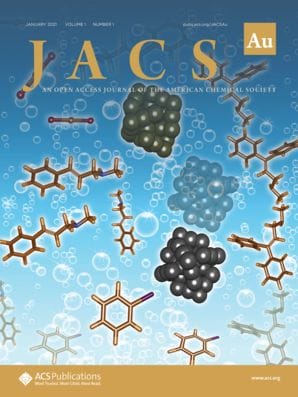This year's award recognizes two winning articles, nominated by the JACS Au Early Career Advisory Board and selected by the journal's editorial team. Learn more about this inaugural award and read the winning research below.

Each year since 2021, JACS Au has appointed an Early Career Advisory Board (ECAB) to provide advice, guidance, and perspectives from emerging independent scholars from across the chemical sciences. In 2022, we introduced a new ECAB initiative called JACS Au ECAB Selects, which highlights favorite papers nominated by our ECAB members throughout their year of service on the board.
These papers demonstrate the strength and breadth of the high-quality research published in JACS Au across a wide range of disciplines. At the end of the ECAB’s service year, the ECAB Selects papers make up the pool from which the JACS Au Outstanding Paper is selected by our editorial team. The winner(s) are announced in an editorial, given a waiver to publish in JACS Au or any other ACS Au journal, and highlighted across our website and social media. This Summer marks the selection and announcement of the inaugural JACS Au Outstanding Paper Award.
Read the Winning Papers
Graduate Student Women’s Perceptions of Faculty Careers: The Critical Role of Departmental Values and Support in Career Choice
Morgan E. Howe*, Melony M. Kim, and Samuel Pazicni*
This study examines why faculty positions are causing so many women to turn elsewhere for employment. Another impressive aspect of this work is the surveyed sample size, as well as how much attention was taken to design the survey by grounding it in the social cognitive career theory.
Finally, the findings of this work are applicable to all chemistry disciplines and beyond and provide a lot of food for thought and reflection. How do we as a scientific community address the issues of overwork, unreasonably high expectations, lack of work-life balance, and lack of mental health support?
Quantum Chemical Calculations to Trace Back Reaction Paths for the Prediction of Reactants
Yosuke Sumiya, Yu Harabuchi, Yuuya Nagata, and Satoshi Maeda*
This paper describes a new computational method for the ab initio prediction of retrosynthetic pathways in organic transformations.
This achievement should be an outstanding technology to pave the way for even non-experts to accurately predict organic reactions, thus enabling not only the rapid production of organic materials and medicines, but also the development of novel organic transformations in the future.
